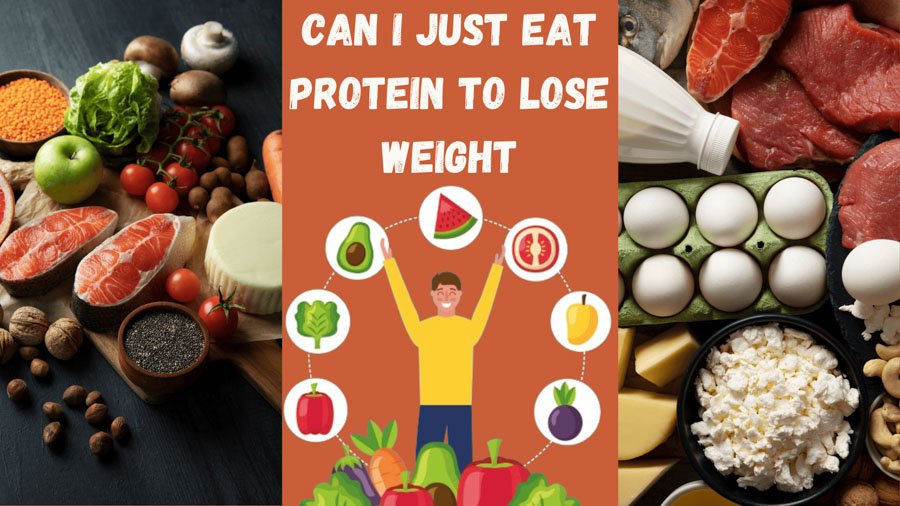As the diet industry continues to boom, more and more people are looking for quick and easy ways to lose weight. One popular trend that has emerged is the idea of solely consuming protein in order to shed pounds. But is this really a sustainable and healthy way to lose weight? In this article, we will explore the question “Can I just eat protein to lose weight?” and dive into expert insights and risks associated with this approach.
Importance of a Balanced Diet
Before delving into the specifics of consuming only protein for weight loss, it’s important to understand the role of a balanced diet. A balanced diet consists of a variety of nutrients from different food groups including carbohydrates, proteins, and fats. Each nutrient group serves a specific function in the body and is crucial for maintaining overall health and well-being.
Carbohydrates, for example, provide the body with energy, while proteins are essential for building and repairing tissues. Fats also provide energy and aid in the absorption of certain vitamins. Additionally, a balanced diet includes essential vitamins and minerals that help support various bodily functions.
Nutritional Deficiencies
While consuming protein may lead to weight loss, it is not a sustainable approach in the long run. Eating only protein means missing out on other vital nutrients that are necessary for optimal functioning of the body. These include essential vitamins, minerals, and fiber.
Additionally, relying solely on protein can lead to nutritional deficiencies, which can have negative effects on overall health. For example, insufficient intake of fruits and vegetables can lead to a lack of antioxidants, which protect the body against diseases and promote healthy aging. Lack of fiber can also lead to digestive issues such as constipation and bloating.
Negative Health Effects of Excess Protein
Consuming an excess amount of protein can also have negative health effects. High-protein diets put a strain on the kidneys as they have to work harder to process and eliminate excess protein from the body. This can potentially lead to long-term health problems, such as kidney disease.
Moreover, a high-protein diet often means consuming an excessive amount of saturated fats, which can increase cholesterol levels and increase the risk of heart disease. It’s important to note that not all sources of protein are created equal. Eating too much red meat, for example, has been linked to an increased risk of certain cancers.
How to Lose Weight Just by Eating Protein
Now that we’ve addressed the importance of a balanced diet and the potential risks of consuming only protein, let’s explore how protein can still play a role in weight loss when combined with other healthy lifestyle habits.
Understanding Protein and Its Role in Weight Loss
Protein is often referred to as the building blocks of the body as it is essential for muscle growth and repair. When it comes to weight loss, protein plays a crucial role in preserving lean muscle mass while reducing body fat. This is because muscle tissue burns more calories at rest compared to fat tissue.
Furthermore, protein has a higher thermic effect of food (TEF) than other macronutrients, meaning that the body burns more calories digesting and metabolizing protein compared to carbohydrates or fats. This is one reason why high-protein diets have been associated with weight loss.
Lean Protein Sources
As mentioned earlier, not all protein sources are created equal. When incorporating protein into your diet for weight loss, it’s important to choose lean options. These include chicken breast, fish, tofu, and legumes. These sources of protein are low in saturated fats and provide additional nutrients such as vitamins and fiber.
It’s also important to vary your protein sources to ensure a well-rounded intake of essential amino acids, which are the building blocks of proteins. Consuming a variety of protein sources will also make your meals more interesting and satisfying.
The Importance of Calorie Intake
While protein can aid in weight loss, it’s important to note that the key to losing weight is still a calorie deficit. This means consuming fewer calories than your body burns in a day. Protein can help with weight loss by increasing satiety and reducing overall calorie consumption.
However, it’s crucial to keep track of your calorie intake and aim for a balance of macronutrients in your diet. Consuming too much protein can still lead to weight gain if it puts you over your daily calorie needs.
Balanced Diet with Nutrient-Dense Foods
As mentioned earlier, a balanced diet includes essential vitamins and minerals from various food groups. While protein plays a role in weight loss, it should not be the only focus. It’s important to incorporate nutrient-dense foods such as fruits, vegetables, and whole grains into your diet. These foods are low in calories but provide essential vitamins and minerals that are necessary for optimal health.
Including these foods in your diet will also add variety and make your meals more enjoyable. You can try incorporating protein into dishes like salads, stir-fries, and grain bowls to create a well-rounded meal.
Hydration and Physical Activity
Along with a balanced diet, staying hydrated and engaging in regular physical activity is crucial for weight loss. Water helps to flush out toxins and waste from the body, aiding in digestion and keeping you feeling full. Aim for at least 8 glasses of water a day.
Regular physical activity not only burns calories but also helps to maintain muscle mass and boost metabolism. When trying to lose weight, it’s important to incorporate both cardiovascular exercise and strength training into your routine to see the best results.
How Does Protein Help with Weight Loss?
Now that we’ve explored how to incorporate protein into a healthy weight loss plan, let’s take a closer look at how protein specifically aids in shedding pounds.
Thermic Effect of Protein
As mentioned earlier, protein has a higher thermic effect compared to carbohydrates and fats. This means that the body burns more calories digesting and metabolizing protein. Research has shown that the thermic effect of protein can be up to twice as high as that of carbohydrates or fats.
This means that by consuming protein, you are essentially burning more calories throughout the day, even at rest.
Protein and Satiety
Protein is known for its ability to keep you feeling full and satisfied. This is because it takes longer to digest compared to other macronutrients, resulting in a slower release of energy. Additionally, protein triggers the release of hormones that signal to the brain that you are full, reducing the chances of overeating.
Studies have shown that incorporating protein into your meals can lead to a decrease in calorie intake and help with weight loss.
Preservation of Muscle Mass
When trying to lose weight, the goal is typically to lose fat while preserving lean muscle mass. Protein plays a crucial role in this process. By consuming enough protein while following a calorie deficit, you can maintain muscle mass and prevent muscle loss. This is especially important for those engaged in strength training, as muscles require protein to repair and grow.
Healthy Sources of Protein
As mentioned earlier, not all sources of protein are created equal. It’s important to choose healthy options such as lean meats, fish, tofu, and legumes. These sources of protein also provide additional nutrients and are lower in saturated fats compared to red meat.
Expert Review on Can I Just Eat Protein to Lose Weight?
We’ve explored the potential risks and benefits of consuming only protein for weight loss, but what do experts have to say about this approach? We reached out to registered dietitian, Lisa Garcia, for her insights on this topic.
According to Garcia, “It’s not recommended to consume only protein when trying to lose weight. While protein is important for preserving muscle mass and boosting metabolism, a balanced diet that includes all macronutrients is crucial for overall health.”
She goes on to say, “Additionally, consuming only protein without considering overall calorie intake can lead to nutrient deficiencies and potential health problems in the long run.”
References
- Paddon-Jones, D., Westman, E., Mattes, R. D., Wolfe, R. R., Astrup, A., & Westerterp-Plantenga, M. (2008). Protein, weight management, and satiety. The American Journal of Clinical Nutrition, 87(5), 1558S-1561S.
- Leidy, H. J. (2015). Increased dietary protein as a dietary strategy to prevent and/or treat obesity. Nestle Nutrition Institute Workshop Series, 82, 89-100.
- Westerterp-Plantenga, M. S. (2010). Protein intake and energy balance. Regulatory Peptides, 149(1-3), 67-69.
- Halton, T. L., & Hu, F. B. (2004). The effects of high protein diets on thermogenesis, satiety and weight loss: a critical review. Journal of the American College of Nutrition, 23(5), 373–385.
FAQs
1. Does protein help burn belly fat?
While there is no specific food that can target belly fat, protein can aid in weight loss, which may result in a reduction of overall body fat, including belly fat. However, it’s important to focus on a balanced diet and regular physical activity rather than solely relying on one food group.
2. What happens if you eat a high-protein diet without exercise?
Consuming a high-protein diet without exercise may still result in weight loss due to reduced overall calorie intake. However, it’s important to incorporate physical activity to maintain muscle mass and promote overall health.
3. Will I gain weight if I only eat protein?
Consuming only protein without considering overall calorie intake can lead to weight gain, as a calorie surplus will still result in weight gain regardless of where the calories come from. It’s important to focus on a balanced diet and caloric deficit for sustainable weight loss.
4. Can you lose weight by eating only protein?
While consuming only protein may lead to weight loss due to reduced overall calorie consumption, it is not a sustainable approach in the long run. A balanced diet that includes all essential nutrients is crucial for overall health and well-being.
Conclusion
In conclusion, while consuming protein can aid in weight loss, it is not recommended to solely rely on this macronutrient for sustained weight loss. A balanced diet that includes all essential nutrients and a caloric deficit is crucial for optimal health and sustainable weight loss. Additionally, it’s important to choose lean sources of protein and incorporate regular physical activity into your routine for best results. Remember, weight loss is a journey and requires a holistic approach for long-term success.










